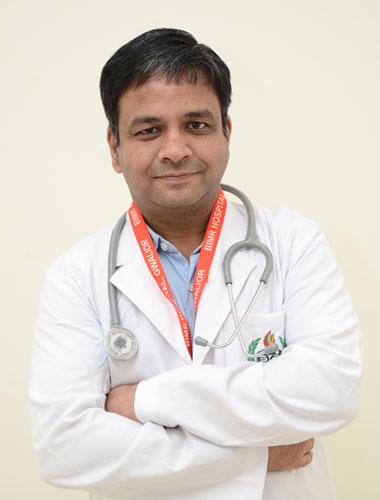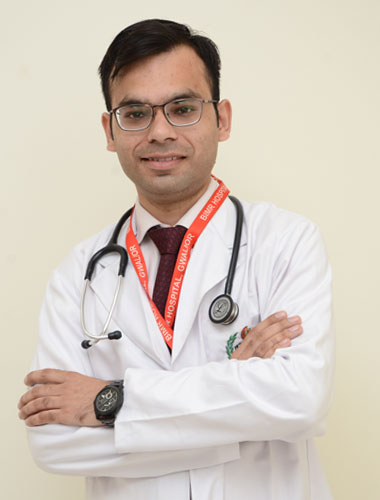
Department of Sleep Medicine
BIMR sleep medicine department is first center to start a comprehensive sleep laboratory in Gwalior. Dr. Deepanshu Singhal is the Consultant ENT Surgeon, Head the Department of Sleep disorders. He is one of the member of the World Association of Sleep Medicine (WASM). He is the one of the Founder Member of Indian Association of Surgeons for Sleep Apnoea (IASSA).
The sleep medicine department at BIMR hospital provides comprehensive management of sleep disorders. Facilities available are
SLEEP APNEA
Sleep apnea is a type of sleep disorder characterized by pauses in breathing during sleep. Each pause in breathing is called an Apnea, can last from at least ten seconds to several minutes, and may occur 5 to 30 times or more an hour. Similarly, each abnormally shallow breathing event is called a Hypopnea.
Sleep apnea symptoms
"The Suffer's who doesn't suffer".
An estimated 10% to 30% of adults snore. In some of them, snoring may have no serious medical consequences. However, for others, loud nightly snoring may be the first indication of a potentially life-threatening disorder called obstructive sleep apnea syndrome (OSAS) or simply Obstructive Sleep Apnea.
During sleep, respiration and heart rate decreases and blood pressure and body temperature changes. An insufficient sleep or problems affecting the functions and health.
Apnea is a temporary interruption of breathing. People suffering from sleep apnea stop breathing repeatedly during sleep, for periods ranging from several seconds to a minute or more.
Obstructive apnea is caused by upper airway occlusion. Apnea occurs when throat muscles and tongue relax during sleep and partially or completely blocks the airway. Risk factors may be obesity, enlarged tonsils and adenoids.
If within an hour the patient has at least ten interruptions in breathing, each lasting at least 10 seconds each, the amount of oxygen reaching the brain is insufficient. In this case, the concentration of carbon dioxide in the blood increases heart rate variations occur. Decrease in oxygen concentration triggers a partial awakening (arousals), together with a snore powerful and sudden inspiration. These arousals remain unnoticed by the patient, but produce a superficial sleep. This light sleep leads to poor recovery of the body during the night and daytime sleepiness and fatigue.
Patients suffering from sleep apnea often feel very tired and sleepy during the day and their ability to concentrate and daytime performance suffer dramatically.
If you have OSAS, you may not get enough oxygen during sleep and probably don't sleep "soundly". You may suffer daytime sleepiness that affects your work and/or social activities, and may even lead to car accidents. OSAS can also put you at risk for high blood pressure, heart failure, heart attack, or stroke. Snoring loudly every night, in all positions, calls for a visit to a sleep specialist.
Sleep Lab
Our sleep lab is designed to evaluate, diagnose, treat and help patients to manage OSA. The sleep study is a painless process conducted on the patient at night, whereby the patient has to sleep in lab. A specially trained technologist connects polysomnography machine. Our State-of-the-art polysomnography machine monitors brain waves, breathing, blood oxygen levels, heart rate, snoring and muscle activity during sleep. On the next day the patient will receive a complete sleep report which defines and diagnoses the sleep-related problem.
Instructions for the patient who undergo sleep study
Polysomnography (Sleep Study)
A Sleep Study or Polysomnogram (PSG)is a multi-component test, which electronically transmits and records specific physical activities while you sleep. The recordings become data, which will be "read" or analyzed by a qualified physician to determine whether or not you have a sleep disorder.
There are 4 types of Polysomnographic Studies. They are:



